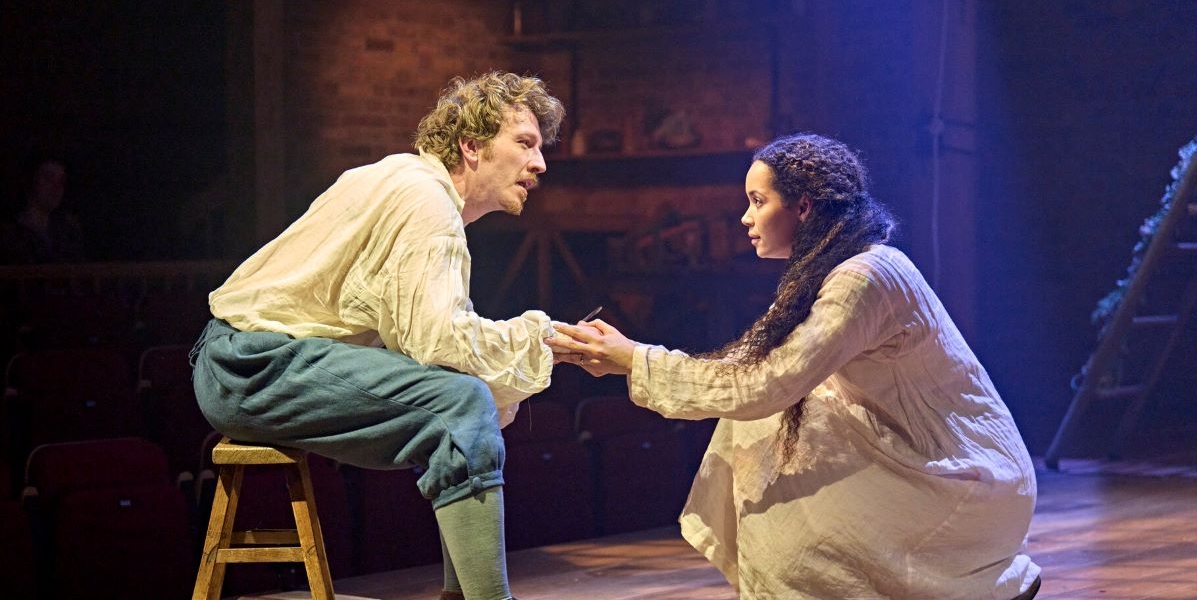The adaptation of the novel Hamnet by Maggie O’Farrell is a fine example of ensemble work. Lolita Chakrabarti clearly understands the soul of the book and has straightened out its timeline for the sake of a coherent drama. Full praise to the director, Erica Whyman, for her ability not just to create a cohesive company of performers but also for her inventive ways of portraying elements of magic and mysticism that are so much a part of the book and of the interpretation of Agnes (known to us as Anne) Hathaway.
This production is a compelling piece of theatre, showing the relationship of Will Shakespeare and his wife and their bonds with their children. Maggie O’Farrell has clearly done her research and the characterisations and incidents that she has created are emotionally vibrant and make sense logically. Perhaps nothing in real life happened exactly as presented in O’Farrell’s version of the tale, but there is nothing in this play that is implausible or could not have happened.
The centre of this interpretation is the story of Agnes herself. She is a kind of seer, deeply in touch with the natural world, afflicted with premonitions and soulful understanding. That she is illiterate does not preclude her being intelligent, especially emotionally. Madeleine Mantock is utterly convincing and is the pivot of the story. I admired her physicality, was moved by her moments of stillness and believed utterly in every nuance she brought to the portrayal of Agnes.
Tom Varey is a convincing Will Shakespeare. We see and understand his early frustrations and the emergence of his talent. Both Mantock and Varey managed to age convincingly too; the tale covers 18 years of their lives. They matured mainly through fine acting, though I did notice that Agnes and Will’s clothing got more stylish as he became more successful in the theatre. Obioma Ugoala played Bartholomew, Agnes’s brother, so appealingly that I wanted to see more of him and wished he had had an even larger part. The rabid prejudices, religious zealotry and fearfulness of the era were embodied in Sarah Belcher, as Agnes’s stepmother, Peter Wright as William’s disgraced father and Elizabeth Rider as William’s mother.
The first half of the play is a kind of “set up”, with powerfully evocative staging of Agnes’s relationship with her kestrel, her understanding of healing, her strongly independent approach to life, her love for Will and, finally, the births of her children. The very Brechtian effect of how the look of her pregnancy was created was, like many inspired images from this play, one that I will never forget. The second half of the play is dominated by the tale of the children and the plague that nearly took Judith Shakespeare and did kill her twin brother, Hamnet. Alex Jarrett (Judith), Ajani Cabey (Hamnet, doubling later as the actor playing Hamlet) and Harmony Rose-Bremner (Susanna) were striking and convincing in their playing of the youngsters. I was also struck by the Will Kempe of Peter Wright. I very much liked the logic of the story of how Will might have got involved with theatrical people. The doublings of parts worked very well. The evening was, for me, impeccably cast.
The play was very clear on suggesting how Shakespeare’s plays were not invented out of a vacuum but had hidden connections to his own life story. The big pay-off, when Will writes Hamlet, and Agnes sneaks in to see the play and realizes its meaning to the bereft and grieving father in him, and how it moves the mother in her and makes her see her husband in a new way, worked as a complete tying together of the story and was almost inexpressibly moving. This is a truly excellent evening of theatre on many levels.

